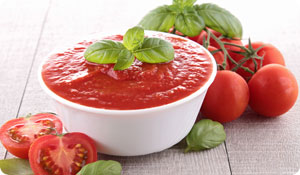
Whether you've been diagnosed with pre-diabetes, type 1 diabetes, or type 2 diabetes, monitoring your blood glucose levels is extremely important. According to the American Diabetes Association (ADA), what you eat is a key factor in keeping glucose levels in check and managing diabetes. And sugar is a surefire way to send blood glucose levels spiraling out of control. Here are some seemingly innocuous foods that pack a surprisingly potent sugar punch:
Red Wine Vinaigrette Salad Dressing - 8 grams of sugar per 2 Tablespoons.
When dousing a salad with dressing, few give thought to the amount of sugar being applied to the otherwise healthy bed of vegetables.
Light Cranberry Juice - 33 grams of sugar per 8 oz.
This tart and tangy juice tastes anything but sweet. However, its sugar content is not to be trifled with.
Raisins - 29 grams of sugar per ¼ cup.
Before consuming fistfuls of these dried grapes, be mindful of the label.
Microwavable Tomato Soup - 18 grams of sugar per 1 cup.
Sugar? In soup? You bet.
Spaghetti Sauce - 11 grams of sugar per ½ cup.
We all knew that pasta is high in carbohydrates, but a sneaky sugar culprit is the sauce itself.
Vanilla Soy Milk - 11 grams of sugar per serving.
Health food stores popularized this milk alternative, but the sugar content is something to pay attention to as well.
Frozen Strawberries- 70 grams of sugar per 1 cup
When purchasing these frozen berries , make sure that only one ingredient is listed: "strawberries."
Ketchup - 4 grams of sugar per serving
Sugar may the last thing on your mind when slathering a hamburger with this condiment, but think again.
Fruit On The Bottom Yogurt - 40 grams of sugar per 8 oz. container
Yogurt has been marketed as a healthy snack, however few think to check the label for sugar.
Honey - 17 grams of sugar per 1 Tablespoon.
Often used in place of sugar, this substitute still has a very high sugar content.
While you may not have to avoid these foods altogether, it's important that you carefully investigate what foods are going to affect your blood glucose levels. According to the National Diabetes Information Clearinghouse, controlling your blood glucose levels helps to reduce the risk of diabetes complications including cardiovascular, eye, kidney, and nerve diseases. The ADA recommends a comprehensive approach to disease management including working with a registered dietician to assist in proper food choice and planning. In addition it is suggested that your healthcare team consist of your primary care physician, an eye doctor, and a podiatrist, among others.





